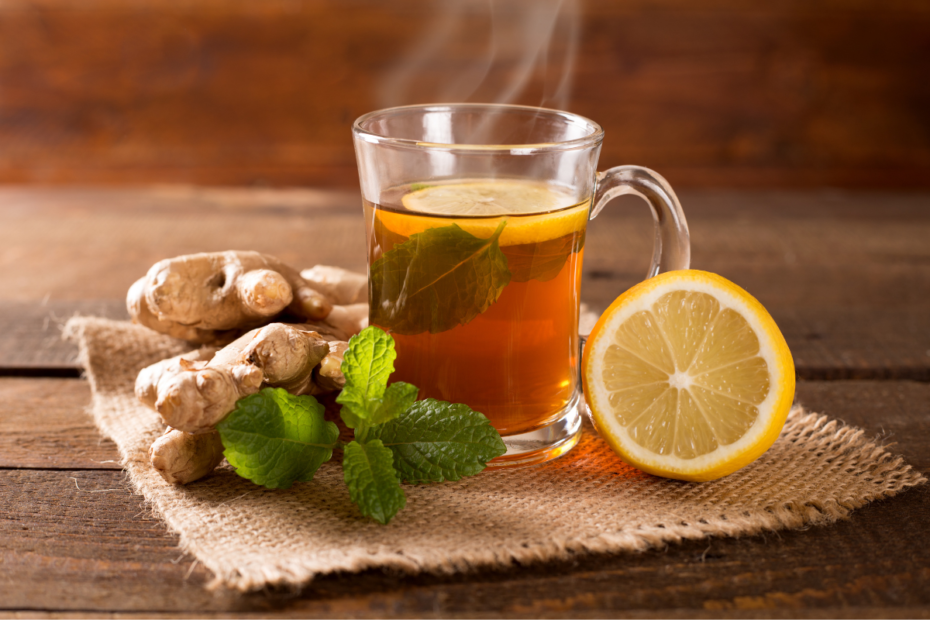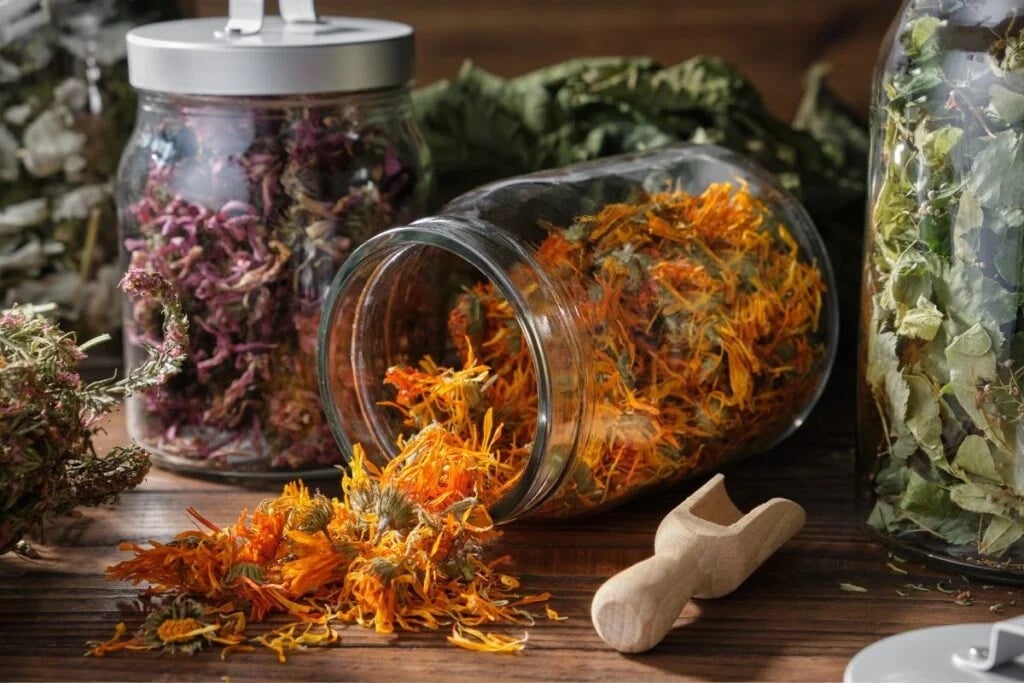Ginger (Zingiber officinale) is a spice plant belonging to the Zingiberaceae family. The edible portion used in cooking and medicine is the thick, fleshy rhizome – an underground stem often called the “root” despite not being a true root. This rhizome contains 1-3% essential oils. Fresh ginger resembles a knotted, branched piece of wood, while dried ginger is ground into pale, sand-colored powder. People usually use raw rhizomes and the powdered form to prepare ginger tea, known for its distinctive, robust flavor. Let’s find out more about ginger tea benefits, combinations, and more.
Ginger originates from southern China, where it remains an essential ingredient in everyday cooking, used in both boiling and frying. Today, many regard it as one of the healthiest and most flavorful spices, used widely. Its scent is fresh and citrusy, reminiscent of lemon, while its taste is pungent, warm, and slightly biting. As a spice, ginger is typically grated or finely chopped and added to dishes. The longer you heat the ginger, the spicier it becomes, though its fragrant and refreshing notes gradually fade.
Grated ginger is often added to coconut milk-based stews and curries for an aromatic twist in Thailand.
Indonesian people traditionally rubbed the meat with a paste made from ginger and chili peppers before grilling. In Japan, ginger juice is brushed onto chicken before cooking, and young, pickled ginger rhizomes are served as a palate cleanser alongside sushi.
In northern India, ginger is fried in oil with onions or garlic to create rich, flavorful sauces. Ginger tends to lose its sharpness during cooking, softening its initial heat.
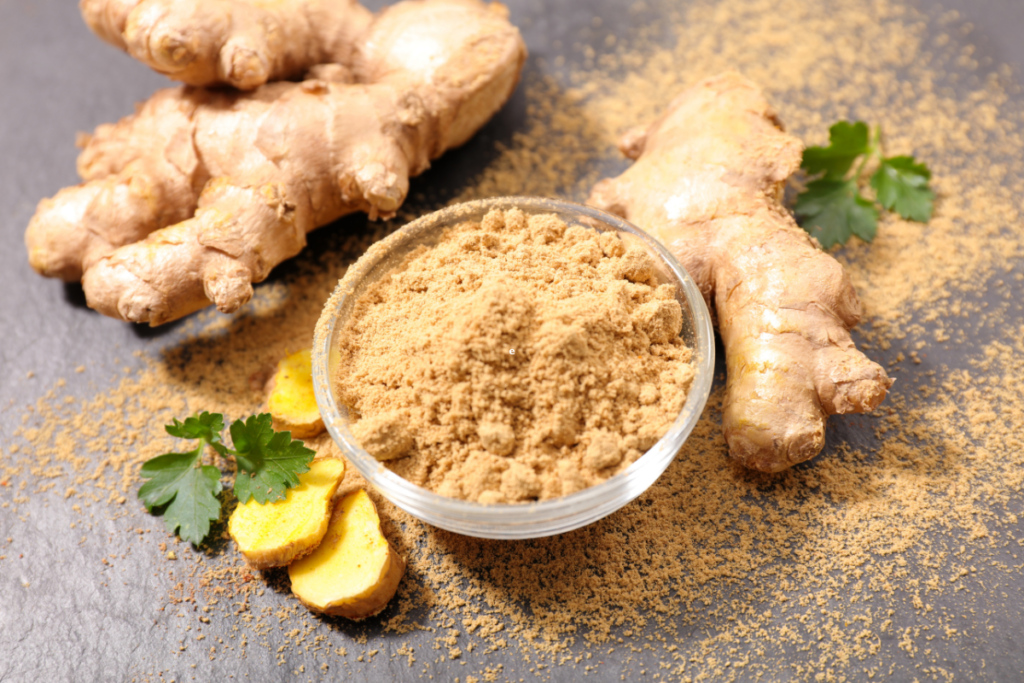
Health Benefits of Ginger
Beyond its unique taste, ginger is prized for its extensive beneficial health effects. You can consume it in many forms—fresh, dried, powdered, as an oil, or as juice—making it a versatile ingredient in culinary and wellness recipes. Here are some key health benefits of ginger tea and root:
- One of ginger’s main active compounds, gingerol (the element responsible for its unique aroma), stimulates the digestive system. It speeds up the breakdown of food, helping prevent sluggish digestion and promoting more efficient elimination. Ginger helps alleviate bloating, gas, and digestive discomfort from fermentation or constipation.
- Gingerol provides potent anti-inflammatory and antioxidant benefits. It combats free radicals—unstable molecules that can damage cells and contribute to chronic diseases.
- Ginger is well-known for alleviating nausea. It helps the stomach empty for those undergoing chemotherapy, experiencing morning sickness during pregnancy, or dealing with motion sickness.
- Some studies suggest that ginger can support weight loss by improving metabolism and fat-burning processes, making it a helpful addition to the diet of individuals managing obesity.
- Ginger may help relieve symptoms of osteoarthritis—a degenerative joint condition that causes pain and stiffness—thanks to its anti-inflammatory properties.
- Ginger is believed to have specific benefits for men. It may act as a natural aphrodisiac by stimulating testosterone production and enhancing libido. Additionally, ginger may indirectly support testosterone levels by aiding in fat loss, especially in cases where excess fat disrupts hormone balance. It may also slightly improve sperm quality in cases of male infertility.
Ginger Tea Benefits
Ginger tea is particularly favored during the colder seasons. People value its ability to strengthen the immune system and combat colds and flu. However, it also serves as a refreshing and revitalizing drink during the warmer seasons. Brewing ginger tea with added ingredients like lemon, honey, cumin, or turmeric becomes even more potent. With these additions, the tea contributes its health-boosting properties.
Supermarkets and tea shops offer a wide variety of ginger teas with different flavors and blends, so making it at home is simple and rewarding. Most commercial blends use dried ginger, which provides similar health benefits. However, teas prepared from fresh ginger root tend to have a stronger, more vibrant flavor, though they require more preparation time.
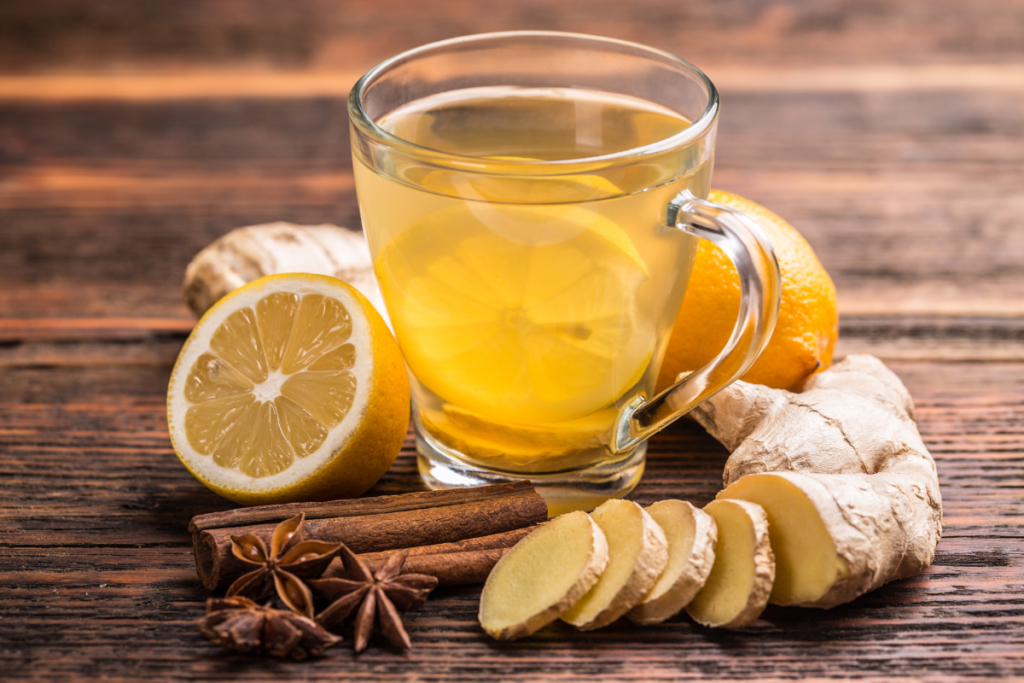
How to Make Ginger Tea
Ginger tea is an aromatic, slightly spicy, and health-boosting drink that works equally well to refresh you during the summer heat or to warm you up in winter. You don’t need much effort to make it at home.
You will need:
- A fresh piece of ginger root
- Water
Instructions:
- Cut off any tough knots or dry ends from the ginger root. Peel the skin, the usable portion.
- Slice the peeled ginger into thin pieces.
- Place a few slices into a cup, pour over boiling water, and cover. Let it steep for at least 10 minutes to allow the flavors to infuse. For a more robust brew, let it steep even longer.
- If you are making a larger batch in a teapot, adjust the amount of ginger and water accordingly. You can also simmer the tea for a few minutes. The flavor intensity can be customized to your taste.
Ginger Water
Ginger water is a milder version of ginger tea, making it ideal for more frequent consumption. It’s a perfect way to increase your daily fluid intake, especially if you struggle to drink enough plain water throughout the day.
You will need:
- 1.5 teaspoons of freshly grated ginger root
- About 4 cups or 1 liter of boiling water
Place the grated ginger into a pot or teapot with boiling water. Stir well, remove from heat, and let it steep for 5–10 minutes until it cools slightly. Strain the liquid through a fine sieve. You can store ginger water in the refrigerator and enjoy it cold as a refreshing summer beverage. Add honey, lemon, or a mint leaf for extra flavor.
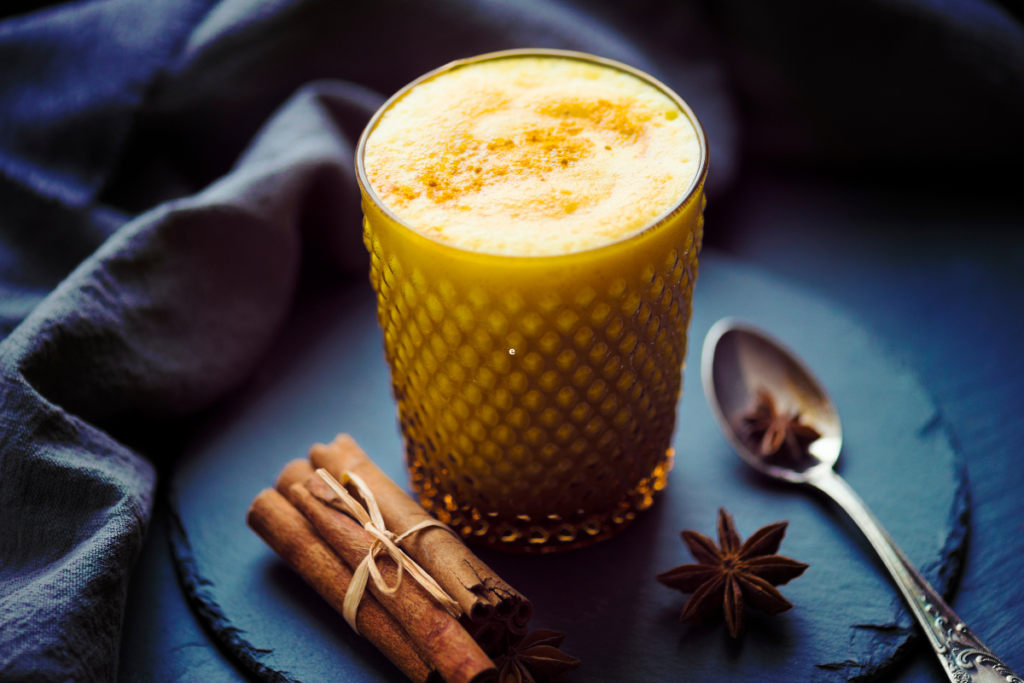
Cinnamon, Honey and Ginger Tea Benefits—or Latte
While you can prepare this delightful drink with water, making it a soothing ginger tea with cinnamon and honey, this version is even more indulgent. We recommend trying it as a warming ginger latte with honey and cinnamon.
You will need:
- 500 ml almond milk
- 2 teaspoons of freshly grated ginger root (adjust to your preferred level of spiciness)
- 1–2 cinnamon sticks
- Honey to taste, depending on your preferred sweetness level
Instructions:
- Bring the almond milk to a gentle boil in a saucepan. Add the grated ginger and cinnamon sticks, then simmer on low heat for about 5 minutes to allow the flavors to blend. Once the mixture is infused, use a milk frother or whisk to create a foamy texture. Let it cool slightly, then stir in honey to taste.
- For a cozy presentation, garnish the drink with one of the cooked cinnamon sticks. To enhance the health benefits, sprinkle in a pinch of black pepper, nutmeg, cardamom, turmeric, or other warming spices.
Cumin and Ginger Tea Benefits
Ginger tea with cumin is a brilliant natural aid for supporting weight management. It boosts metabolism and helps prevent fluid retention in the body. Additionally, this combination strengthens the immune system, making it especially helpful during the colder months when illnesses are more common.
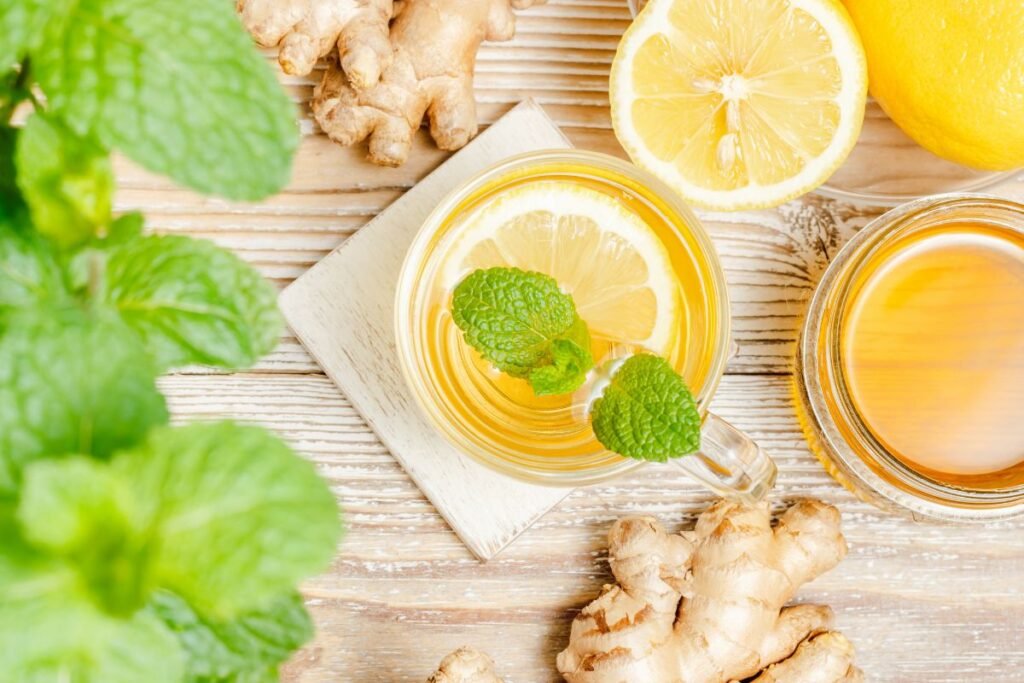
Rich Ginger Beverage with Citrus and Spices
Try this rich ginger tea with citrus fruits and spices for a deeply nourishing and invigorating drink. It’s a real tonic for both body and mind. Don’t be afraid to experiment based on what ingredients you have on hand—adjust the proportions to your taste. Let your intuition guide you—your body often knows exactly what it needs.
You will need:
- Orange and lemon slices (be sure to thoroughly wash the fruits in hot water before slicing to remove any wax or pesticide residue)
- Fresh ginger root (peeled and sliced into rounds, sticks, or grated)
- Cinnamon stick (avoid ground cinnamon to prevent residue in the tea).
- Black pepper (freshly cracked for maximum benefit)
- Cardamom pods (optional, but adds warmth and depth of flavor)
- Water
- Your favorite natural sweetener: maple syrup, agave nectar, honey, stevia, or sugar
Instructions:
- Bring water to a boil in a pot or teapot. Add the chopped ginger, cinnamon stick, cardamom, and black pepper.
- Remove from heat, cover, and let it steep for about 10 minutes.
- Once it has slightly cooled, add the orange and lemon slices. (Avoid adding citrus to boiling water, as the heat may destroy their delicate vitamins.)
- Serve in a glass mug. For a beautiful presentation, add a slice of citrus or a stick of cinnamon as a garnish.
Flavor Variations for Ginger Tea
You can easily tweak this recipe to create new versions every day, depending on your mood or health needs:
- Ginger and Turmeric Tea Benefits: Turmeric is known for its powerful anti-inflammatory properties. For one cup, use ½ tsp grated ginger and ½ tsp turmeric.
- Cayenne Pepper: A tiny pinch of cayenne boosts circulation, supports digestion, and soothes sore throats. It’s very spicy, so use it sparingly.
- Nutmeg, cloves, and star anise: These spices add bold flavor—use only a little amount to avoid overpowering the tea.
- Fresh Mint Leaves: It adds a refreshing note while aiding digestion and reducing inflammation.
- Green Tea with Ginger Benefits: Add green tea leaves to hot (not boiling) water to preserve their nutrients. Let the tea steep for at least 5 minutes before adding citrus—otherwise, the citrus may cool the water too much, preventing the tea from fully releasing its beneficial compounds.
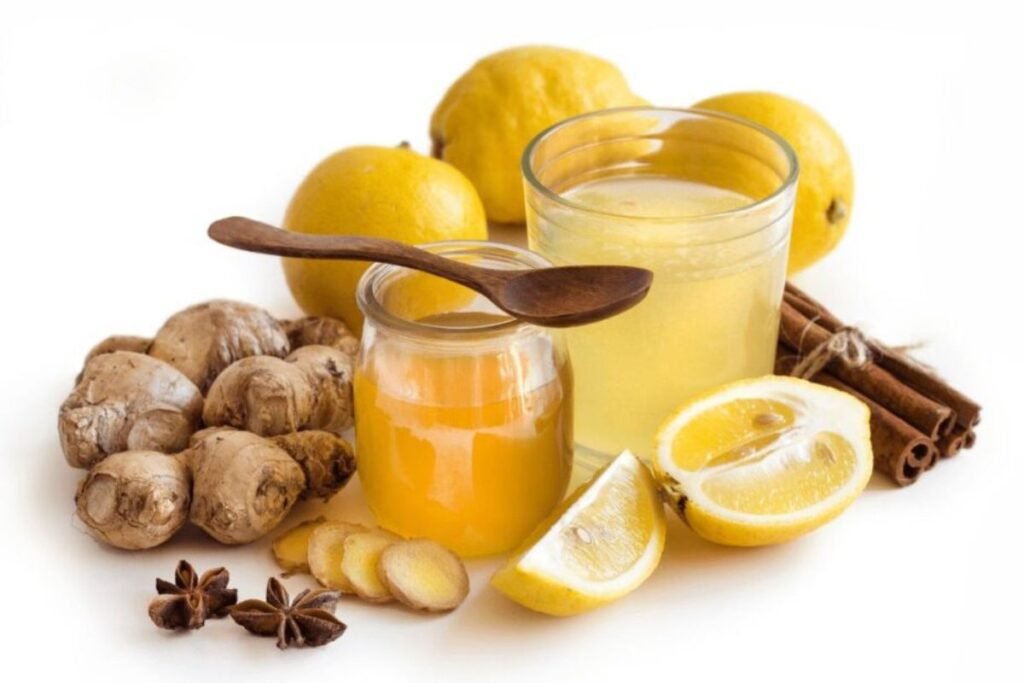
Honey, Ginger Lemon Tea Benefits and Recipe
This is one of the most popular natural cold remedies for immune support and general wellness. The ginger root, honey, and lemon combination is a potent vitamin-rich trio.
You will need:
- 1 large or 2 small lemons (or other citrus, like limes)
- 1 ginger root
- 400 ml of honey
Instructions:
- Wash the lemons thoroughly with hot water. For extra cleaning, soak them in water with a bit of baking soda to remove any wax or chemical residues.
- Slice the lemons (with the peel) and remove any seeds.
- Peel and chop the ginger into chunks.
- Place the lemon and ginger into a food processor and blend until finely chopped.
- Pour the honey over the mixture. If your honey is too thick, gently warm it by placing the jar in a bowl of hot water to help it blend more easily.
- Store the mixture in a clean jar. You can take a spoonful daily or use it to make tea. Mix with hot (not boiling) water to preserve the beneficial enzymes and vitamins.
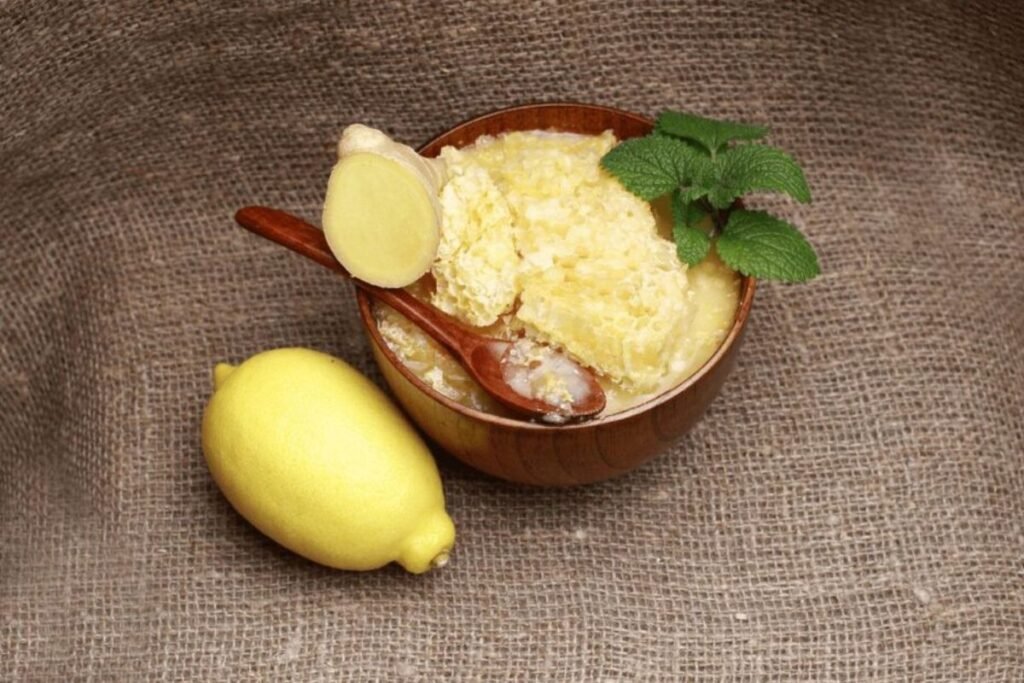
Possible Side Effects of Ginger
Although ginger is generally considered safe for most people, consuming it in large quantities (more than 5 grams of ginger powder daily) may increase the risk of side effects. If you use ginger for therapeutic purposes or in high doses, it is recommended to consult your doctor beforehand.
Ginger is generally safe during pregnancy and breastfeeding in small amounts to relieve nausea. However, pregnant women who have previously experienced a miscarriage or are nearing their due date should avoid ginger as a precaution.
People with blood clotting disorders or those taking blood-thinning medications should also avoid ginger, as it may slow blood clotting and increase the risk of bleeding. Additionally, experts advise stopping using ginger at least two weeks before any scheduled surgery, as it could lead to excessive bleeding during or after the procedure.
In some cases, ginger’s pungent and spicy flavor may also be considered an unwanted side effect, especially for those who need to take it in large amounts for medical reasons but find the taste unpleasant.
Excessive consumption of ginger tea may lead to the following digestive or cardiovascular disturbances:
- Diarrhea
- Abdominal pain
- Heartburn
- Heart rhythm irregularities
If you are taking any medications currently, consult your healthcare provider before starting ginger to avoid possible interactions.
Sources:
- https://www.healthline.com/nutrition/benefits-ginger-tea
- https://www.hopkinsmedicine.org/health/wellness-and-prevention/ginger-benefits
- https://www.forbes.com/health/nutrition/ginger-tea-benefits/
Associative photos © Canva.
